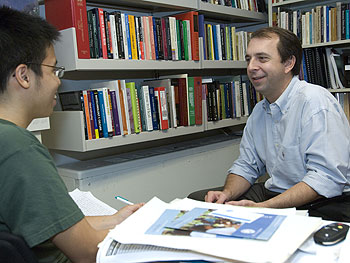Bradley P. Stoner is quite a multi-tasker.
Firmly entrenched in both the Danforth and Medical campuses, Stoner has easily and effectively bridged the gap between the two, combining his love of anthropology with a passion for public health.
Stoner, M.D., Ph.D., associate professor of anthropology in Arts & Sciences and of medicine in the School of Medicine, studies cultural perspectives on disease, particularly sexually transmitted diseases (STDs).

“Medicine and anthropology are both human sciences,” Stoner says. “Anthropology studies populations, whereas medicine is classically patient-oriented — it focuses on the health of individuals. What I like to do in medical anthropology is to create a framework for understanding people’s beliefs about illness and how these affect health-care behaviors, health-seeking strategies and whether patients comply with what their doctor tells them. Different cultural groups have very different beliefs about the nature of illness.”
Born in Indianapolis, Stoner became interested in medicine at a young age, following in the footsteps of his father, a dentist.
He went to Harvard University to study biochemistry, but an elective class his freshman year introduced him to anthropology. He ended up declaring anthropology as a major, hoping to use it as a springboard to medical school.
However, by his senior year, his excitement about anthropology led him to seek a doctorate. After graduating from Harvard, he went to McGill University in Montreal, where he earned a master’s degree in anthropology, followed by a medical degree in 1987 and a doctorate in ’89, both from Indiana University Bloomington.
Upon completing a three-year residency in internal medicine at Duke University, anthropology called Stoner back. He applied for a postdoctoral fellowship at the University of Washington.
“I really wanted to get back into anthropology and thought that the subdiscipline of infectious diseases in medicine was most closely aligned with what I was very interested in doing,” Stoner says.
The University of Washington’s program was well-known at the time for its study of STDs and HIV. Stoner was drawn into STD research studies because of his interest in the anthropological aspects of STD transmission.
That interest led him being hired at Washington University in 1995 after four years at the University of Washington.
“St. Louis at that time was undergoing a syphilis epidemic,” Stoner says. “I was hired mainly because there was no one on the infectious disease faculty who had a primary research or clinical interest in STDs.”

Stoner was able to negotiate a joint appointment with anthropology so that he could teach courses as well as work on research projects in infectious diseases.
“Brad has done a remarkable job since moving to the Department of Anthropology from the medical school to administrate our Medicine & Society Program,” says Richard J. Smith, Ph.D., the Ralph E. Morrow Distinguished University Professor and chair of the Department of Anthropology in Arts & Sciences. “Under his leadership, our medical anthropology group has grown not only as a special undergraduate experience, but as an important graduate program. Next year, in order to meet some of the student interest, Brad will initiate a new undergraduate minor in public health, and two new faculty will join the group. He is one of the most conscientious and dedicated teachers in the department.”
While Stoner currently holds a primary appointment in anthropology, his research interests are still based in disease transmission.
“My medical research now is focused primarily on the study of chlamydia and syphilis. I’m currently doing several community-based studies on transmission dynamics and health services research surrounding STDs,” he says.
One of the major research projects Stoner is involved in is a Centers for Disease Control and Prevention (CDC)-funded study of testing strategies for chlamydia, a disease relatively common in women of reproductive age that, if left untreated, can damage the reproductive system.
It is the most commonly reported bacterial infection in the United States, and many who contract the disease get it again from infected partners in a relatively short amount of time.
“The official recommendation of the CDC is that any woman with chlamydia should be treated but then retested three to four months later to make sure that she’s not reinfected,” says Stoner. “But with many women who do get treated, their male partners often remain untreated. The women then get reinfected from their boyfriend, husband or new partner.”
Very few women follow the CDC’s recommendation. Stoner’s study is hoping to determine the effectiveness of rescreening at home versus telling the women to come back in for a checkup in three to four months.
“Annually, there are about one million reported cases of chlamydia in the United States,” Stoner says. “I think one of the big holes in our public health system is the failure to obtain rescreening. Our hope is that this study will increase that rate.”
Stoner also is examining the psycho-social impact of chlamydia on women. “A lot of women are being diagnosed every year,” Stoner says. “But we are not very clear on how that is impacting them personally. Are they psychologically affected by the diagnosis in a negative way? Does it bother them that they have an STD?”
Stoner has found that many women do worry about aspects of the disease, like the fidelity of their partners, whether or not they will be able to get pregnant and if the diagnosis makes them “dirty.”
“Doctors tend to want to talk about this as strictly a medical condition, give the patient an antibiotic and send them on their way,” Stoner says. “But we are finding that some women have hidden feelings about chlamydia that really need to be addressed and dealt with.”
|
Bradley P. Stoner
Title: Associate professor of anthropology in Arts & Sciences and of medicine in the School of Medicine Family: Wife Leslie and daughters Meredith, 17 and Caroline, 14. Hobbies: Skiing, bicycling and reading.
|
In 1995, Stoner applied for a grant to provide STD training to doctors and nurses in Missouri, Iowa, Kansas and Nebraska. He established the St. Louis STD/HIV Prevention and Training Center, which still operates today.
“Brad has made a tremendous contribution in the field of sexually transmitted infections through his prevention and training center,” says Victoria J. Fraser, M.D., the J. William Campbell Professor of Medicine and co-director of the School of Medicine’s infectious diseases division. “Brad is always enthusiastic, eloquent and engaging in his mastery of the subject. He inspires students to understand the complex dynamics of behavior, social groups, networks and disease transmission.”
Another one of Stoner’s goals is to examine local populations and cultural perspectives on disease, particularly STDs. In 2002, Stoner conducted a two-year project called the “Ethnography of Syphilis,” during which he studied patients with the disease and the health care providers who were treating them.
The study found major differences in perception of what syphilis is, who is responsible for it and how to prevent it in the future.
“Much of my work nowadays is at the interface of medicine, anthropology and public health,” Stoner says. “Public health really is the institution that protects the health of populations, so it’s a perfect arena for anthropologists to get involved in terms of policy and health services formulation.”
His goal is to disclose many of the hidden expectations surrounding health care, particularly STDs, and to learn something about human nature and the perception of disease.
“If a public health program, like an STD clinic, doesn’t fully understand local conceptions of disease transmission — what people are thinking about how the disease is spread — then the program itself will be incomplete in addressing the needs of the people,” Stoner says.
For example, he finds that patients with syphilis often expect the state health department to do a better job of tracking down their partners.
The health department, however, doesn’t have the staffing to conduct a full partner investigation for every STD for every patient. This results in a cycle whereby few partners per STD actually get treated.
Stoner says he is “very happy” at the University. “I’ve found it to be quite flexible. I’m one who has capacities in two different arenas — medicine and anthropology. The University has been helpful and supportive in allowing me to engage both of those arenas.”